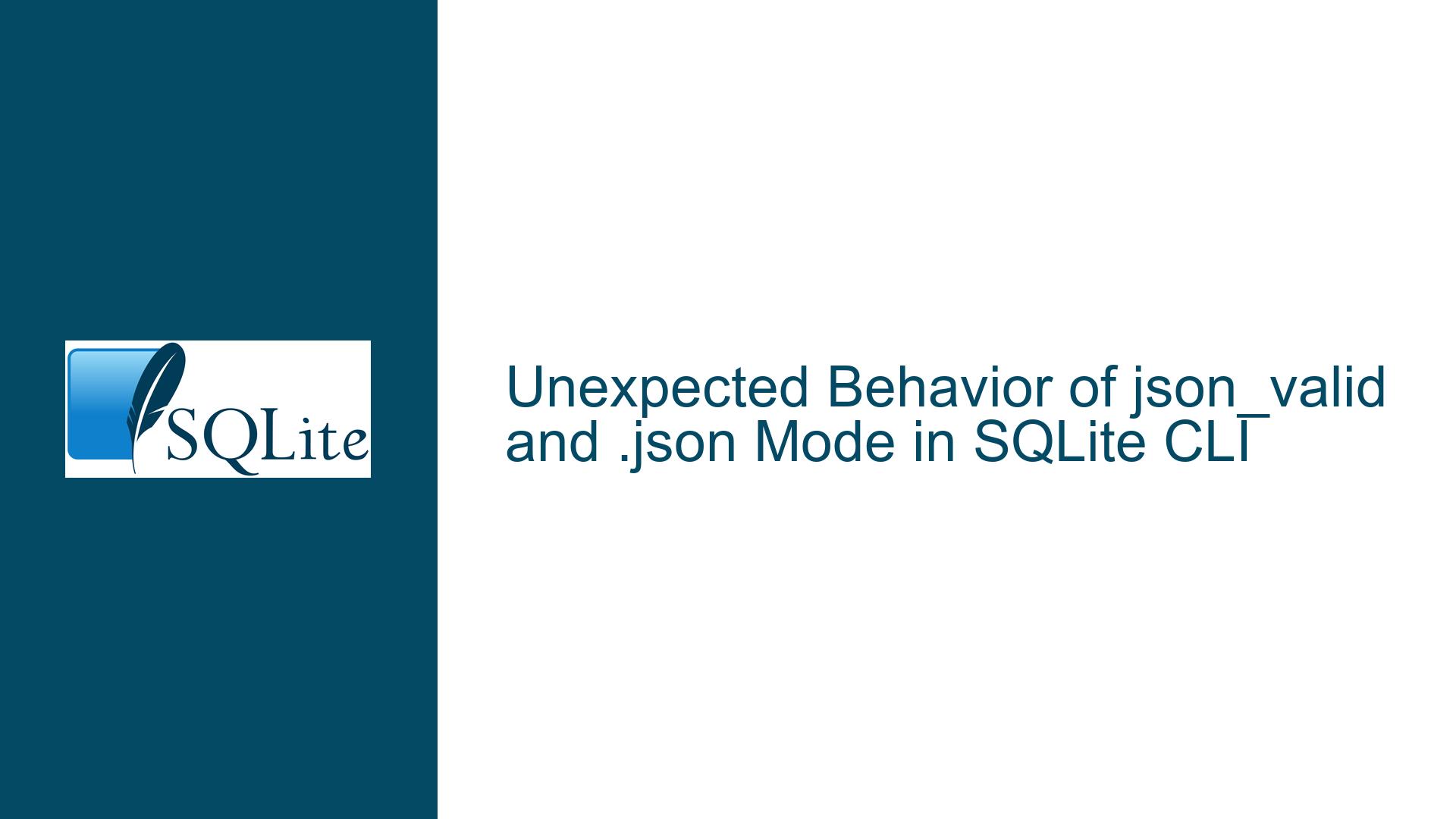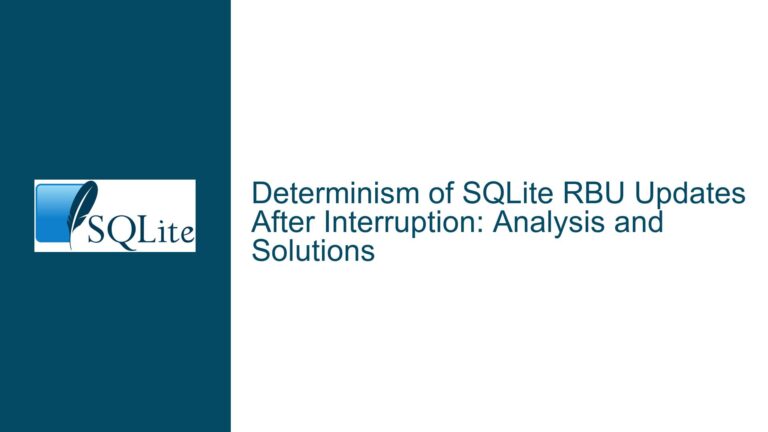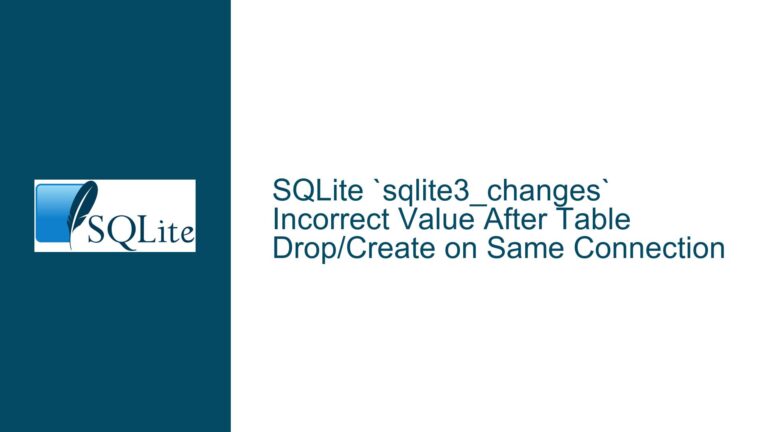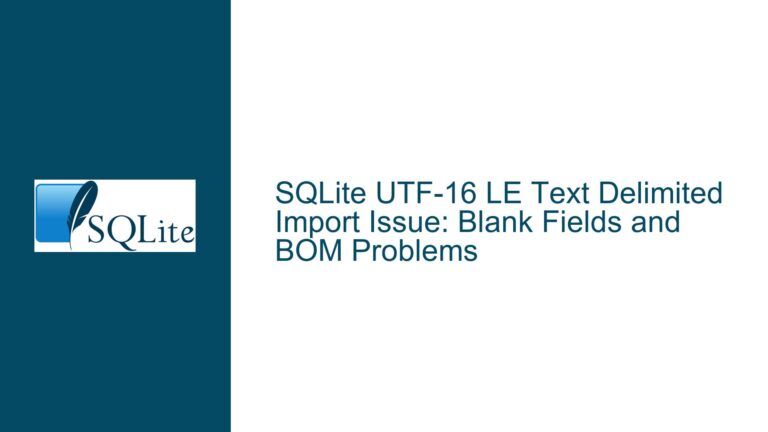Unexpected Behavior of json_valid and .json Mode in SQLite CLI
JSON Validation and Encoding Mismatches in SQLite
The core issue revolves around the unexpected behavior of the json_valid function and the .json mode in the SQLite Command Line Interface (CLI). Specifically, the json_valid function appears to validate JSON values that are not JSON objects, such as integers, while the .json mode in the CLI encodes integers as strings, contrary to the expected behavior. This discrepancy arises from a combination of SQLite’s type affinity system, the JSON specification, and the implementation details of the SQLite CLI.
The json_valid function in SQLite is designed to check if a given string is well-formed JSON, not necessarily a JSON object. This distinction is crucial because JSON values can be objects, arrays, strings, numbers, booleans, or null. The function converts its input to a string and then checks if it conforms to the JSON grammar. This explains why the integer 42 is considered valid JSON, as it is a valid JSON number according to the JSON specification.
On the other hand, the .json mode in the SQLite CLI encodes data based on the declared affinity of the columns. When a column is declared as VarChar (which has TEXT affinity), any numerical data inserted into that column is converted to text form before being stored. This conversion leads to integers being encoded as strings in the JSON output, which may not align with user expectations.
Misalignment Between JSON Specification and SQLite Implementation
The root cause of the confusion lies in the misalignment between the JSON specification and the SQLite implementation. The JSON specification defines a JSON value as any valid JSON object, array, string, number, boolean, or null. However, the json_valid function in SQLite is often misunderstood as validating only JSON objects, not JSON values in general. This misunderstanding is exacerbated by the example provided in the SQLite documentation, which focuses on JSON objects.
Furthermore, the SQLite CLI’s .json mode encodes data based on the column’s declared affinity, not the actual data type of the value. This behavior is consistent with SQLite’s dynamic type system, where the storage class of a value (NULL, INTEGER, REAL, TEXT, or BLOB) is determined by the value itself, but the column’s affinity influences how the value is stored and retrieved. When a column has TEXT affinity, any numerical data is converted to text form, which affects how the data is encoded in JSON output.
The combination of these factors leads to the observed behavior where integers are considered valid JSON by json_valid but are encoded as strings in the JSON output. This behavior is technically correct according to the JSON specification and SQLite’s type affinity system, but it may not align with user expectations, especially when the focus is on JSON objects rather than JSON values in general.
Resolving JSON Validation and Encoding Issues in SQLite
To address the issues with json_valid and .json mode, it is essential to understand the underlying mechanisms and adjust expectations accordingly. Here are the steps to resolve these issues:
1. Understanding json_valid Function Behavior:
The json_valid function checks if a given string is well-formed JSON, not necessarily a JSON object. To ensure that only JSON objects are validated, additional checks can be added to the query. For example, the following query can be used to validate JSON objects specifically:
SELECT Testcase, Expected,
CASE
WHEN json_type(Value) = 'object' THEN json_valid(Value)
ELSE 0
END AS Result,
Value
FROM JTest;
This query uses the json_type function to check if the value is a JSON object before applying json_valid.
2. Custom JSON Encoding for Specific Data Types:
Since the .json mode in the SQLite CLI encodes data based on column affinity, custom queries can be used to generate JSON output with the desired encoding. For example, the following query can be used to encode integers as numbers in the JSON output:
SELECT json_object('Testcase', Testcase, 'Value',
CASE
WHEN typeof(Value) = 'integer' THEN json(Value)
ELSE Value
END) AS json_output
FROM JTest;
This query uses the json_object function to construct JSON objects manually, ensuring that integers are encoded as numbers.
3. Adjusting Column Affinity for Desired JSON Encoding:
If the goal is to have integers encoded as numbers in the JSON output, the column affinity should be adjusted to INTEGER or REAL. For example, the following schema can be used:
CREATE TABLE JTest (Testcase INTEGER, Value JSON);
This schema uses the JSON type for the Value column, which allows for more precise control over how data is stored and retrieved. However, note that SQLite’s JSON type is a text type with additional JSON-specific constraints.
4. Using External Tools for JSON Validation and Encoding:
In cases where SQLite’s built-in functions and CLI modes do not meet the requirements, external tools or libraries can be used for JSON validation and encoding. For example, a Python script can be used to validate JSON objects and encode data with the desired formatting:
import sqlite3
import json
conn = sqlite3.connect('example.db')
cursor = conn.cursor()
cursor.execute("SELECT Testcase, Value FROM JTest")
rows = cursor.fetchall()
json_output = []
for row in rows:
testcase, value = row
try:
parsed_value = json.loads(value) if value else None
json_output.append({'Testcase': testcase, 'Value': parsed_value})
except json.JSONDecodeError:
json_output.append({'Testcase': testcase, 'Value': value})
print(json.dumps(json_output, indent=2))
This script uses Python’s json module to validate and encode JSON data, providing more flexibility than SQLite’s built-in functions.
5. Educating Users on JSON Specification and SQLite Behavior:
Finally, it is important to educate users on the JSON specification and SQLite’s behavior regarding JSON validation and encoding. This includes clarifying the distinction between JSON values and JSON objects, as well as the impact of column affinity on data storage and retrieval. Providing clear documentation and examples can help users align their expectations with the actual behavior of SQLite.
By following these steps, users can resolve the issues with json_valid and .json mode in SQLite, ensuring that JSON data is validated and encoded according to their requirements. Understanding the underlying mechanisms and adjusting expectations accordingly is key to effectively working with JSON in SQLite.






